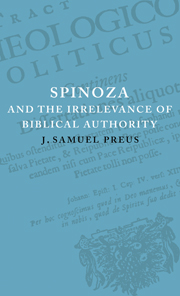Book contents
5 - Starting over: Spinoza's naturalized Bible
Published online by Cambridge University Press: 03 February 2010
Summary
First and foremost we must be on guard, when seeking the meaning of scripture, lest we be preoccupied by our own reasoning, insofar as it is grounded in natural principles of cognition; but in order not to confuse the true meaning with the truth of things, meaning must be investigated from the usage of the language alone, or from a reasoning that recognizes no other foundation than scripture.
Spinoza, TTP viiREVIEW SO FAR
The critical responses of the liberals show that Meyer and his most conservative opponents were using a method that was being surpassed by one that required detailed contextual analysis of the text. The mere fact that Meyer advertised himself as a Cartesian turned out to be no guarantee that he was advancing biblical interpretation. His rationalist hermeneutic in fact resembled that of the medieval philosopher Maimonides more than he apparently knew, even though he and his friend Spinoza shared the fundamental conviction that reason was the final criterion for any truth we could know.
Moreover, the religious peace Meyer sought by his proposal did not occur, nor would the trend toward a more historical exegesis be denied. His argument that meanings should be reduced to preknown truths was met with solid opposition. He may have been quite aware that his philosophical hermeneutic ran counter to scholarly trends toward a more historical view of scripture, but he wanted to unveil a new path for gaining peace and religious truth. Perhaps he believed, with his contemporaries, that the current advances in secular (as opposed to “sacred”) history were finally irrelevant to religious life.
- Type
- Chapter
- Information
- Spinoza and the Irrelevance of Biblical Authority , pp. 154 - 202Publisher: Cambridge University PressPrint publication year: 2001



